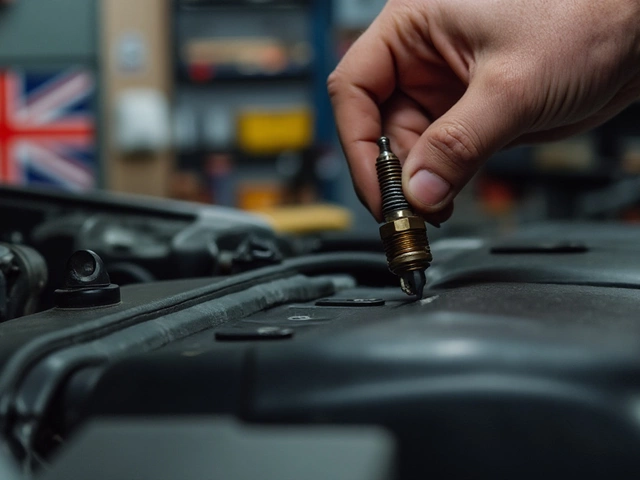We all know that engine oil is crucial for a car's wellbeing, but what exactly happens when a car runs out of oil? Before you find yourself stranded on the side of the road, it's wise to understand how vital this slippery substance is for your vehicle.
Engine oil isn't just any liquid; it's the lifeblood of your vehicle providing lubrication, cooling, and cleaning. When it runs dry, your engine faces a myriad of problems that could lead to significant damage.
This article guides you through what occurs when oil levels drop too low or are depleted entirely, offering you insights into the symptoms to watch for, the potential damage, and how you can prevent a costly breakdown. Buckle up as we delve into the essential knowledge that every driver should have.
- The Role of Engine Oil
- Symptoms of Low or No Oil
- Impact on Engine Components
- Preventative Measures and Tips
The Role of Engine Oil
When people think about a car's vital components, the revered engine often tops the list. Yet, without its unsung sidekick, engine oil, even the mightiest engine would falter. This humble oil serves several critical functions within your vehicle, quietly orchestrating the smooth operation of countless moving parts. Inside a running engine, you have a cacophony of components all interacting at high speeds and temperatures. Without proper lubrication, friction would transform from a necessary mechanical component into a destructive force, as metal grinds against metal, leading to excessive wear and tear.
But how exactly does engine oil play its part in the complex dance of mechanics? First and foremost, engine oil creates a thin film between moving components, which reduces direct contact and resultant friction. This coating not only prolongs the lifespan of each part but also supports the engine's efficiency. Additionally, engine oil aids in heat dissipation. Operating an engine produces intense heat, which, if unchecked, could lead to catastrophic failure. Oil absorbs this heat and transports it away from critical areas to keep everything within safer temperature ranges. Meeting both these necessities is no small feat, and failing to keep up with oil change routines could mean depriving your engine of these vital benefits.
Beyond lubrication and cooling, engine oil plays the pivotal role of cleaning. Over time, engines accumulate deposits from combustion byproducts, dirt, and other particulates. Left unchecked, these can create blockage, reducing engine efficiency and increasing emissions. The oil itself collects these impurities, helping to lead them away to be trapped by the oil filter. Within the intricate web of an engine's workings, keeping particles at bay ensures smooth operation and maintains the delicate balance required for efficiency. A respected engineer once remarked, "The most ingenious piece of technology in your car isn't the dashboard or the drivetrain. It's the oil, silently working in complex harmony to make it all function."
Finally, though less appreciated but equally crucial, engine oil helps in sealing various sections of the engine, supporting compression by sealing tiny gaps, making the overall performance stable and reliable. It ensures that your vehicle health remains optimal, supporting every drive, no matter the distance traveled. By maintaining the right viscosity, engine oil ensures that all the nooks and crevices are filled, reducing power loss caused by blowby – the escape of combustion gases through gaps in piston rings.

Symptoms of Low or No Oil
When your car starts running short on engine oil, it’s not always immediately noticeable, especially if you don't have a keen ear or a trained eye. That said, certain symptoms can act as a beacon, warning you before things take a turn for the worse. One of the first signs might be strange noises coming from under the hood. Without sufficient oil, the engine's moving parts aren't lubricated properly and will begin to grind against one another. This leads to noises such as knocking or tapping, and hearing them should set off alarm bells in your head.
Another indication could be a warning light on your dashboard. Most modern vehicles are equipped with an oil pressure sensor that will trigger a warning light if the oil pressure falls below a safe level. The sensor works alongside the oil pump, sending a signal to the car's computer if it detects low pressure, which is often a result of insufficient oil. Ignoring this warning can swiftly lead to a situation where the oil runs out entirely, resulting in irreparable engine damage.
Continuing our exploration, an overheated engine is yet another common symptom associated with low oil levels. Engine oil performs the crucial task of carrying heat away from the engine, keeping its temperature regulated. Without enough of it, heat builds up, causing the temperature gauge on your dashboard to rise. It's a silent cry for help signaling that your engine is in distress due to inadequate lubrication, potentially leading to catastrophic engine failure if ignored for too long.
If your vehicle has recently become sluggish, failing to perform as it used to, lack of engine oil might be the culprit. Friction increases exponentially without lubrication, taxing the engine's performance capabilities. It will have to work much harder than normal, leading to poor acceleration, decreased power, and notably less efficient fuel consumption. Almost like a domino effect, these symptoms are intricately connected – one leads to the other, each a stepping stone to a growing problem under the hood.
The smell of burning oil is another major red flag. When oil levels are too low, what little oil is left may begin to burn within the engine due to the high heat. If you catch a whiff of something burning coming from your vehicle, it's time to check your oil levels immediately. As if clued in to this issue, Car and Driver once counseled,
"Ignoring an oil smell or letting oil levels run low can irrevocably harm your engine, leading to costly repairs that could have been avoided."

Impact on Engine Components
Engine components rely heavily on engine oil to function smoothly and last long. Without it, friction increases drastically inside the engine, causing metal parts to rub against each other, generating heat that can warp or melt parts. Imagine gears grinding away, metal shards flaking off, and eventually, your car's engine could seize up entirely. This is why maintaining proper oil levels is essential, and neglecting it can spell disaster for your vehicle's heart and soul.
One of the first things to bear the brunt of low or no oil is the crankshaft. Vital for translating the pistons' linear motion into rotational motion needed to power your car, it undergoes immense stress. Without lubrication, the crankshaft and its bearings are prone to faster wear-and-tear, increasing your risk of a catastrophic failure. The cylinder walls and pistons themselves also heat up rapidly, with no oil to dissipate the high temperatures generated by combustion, leading to a potential engine block crack.
Camshafts, which work within close tolerances, depend on a film of engine oil to reduce wear as they rotate thousands of times per minute. Without this, they can easily get damaged, affecting your car's valves and timing mechanism. What's more, rubber seals or gaskets that are supposed to contain the oil can degrade under severe heat, allowing leaks and exacerbating oil depletion. The loss of oil pressure also means that hydraulic components like lifters struggle to maintain good operation, potentially causing misfires or loud clattering noises from your engine compartment.
Oil starvation doesn’t only do mechanical harm; it impacts the cooling system too. The oil in your car plays a crucial role in regulating the temperature by transporting heat away from moving components. Without adequate levels, temperatures can skyrocket, and vital cooling passages may choke, leading to blown head gaskets or cracked heads. A Journal of Automobile Mechanic Research study shows that engines without sufficient oil were twice as likely to suffer from catastrophic overheating compared to those properly maintained.
"When an engine runs out of oil, it's a rapid decline to failure. It may start with a tapping noise, but left unchecked, ends with a significant hit to your wallet," remarked Tom Magliozzi, a renowned automotive expert.
The chain of reactions initiated by limited lubrication can recess all the way to the oil pump. Running dry leads to cavitation, a condition where air bubbles fill the void left by oil. Not only does this prevent your pump from maintaining oil flow, but it causes vibrations that wear on engine bearings. In short, the repercussions of neglecting oil change can be a slow, domino effect of damage that reduces your vehicle's lifespan dramatically.

Preventative Measures and Tips
Taking steps to ensure your vehicle never encounters the dire situation of running out of engine oil is not just wise but necessary for the health and longevity of your car. First and foremost, regular oil changes should be non-negotiable. Most manufacturers recommend changing your oil every 3,000 to 5,000 miles, although this can vary based on the vehicle’s age, make, and model. If you’re uncertain, always refer to the car’s manual. It holds the key to what your specific vehicle requires.
During these changes, pay attention to your oil filter. A clogged filter can restrict oil flow, leading to various issues down the line. Swapping out your oil filter whenever you change your oil ensures that nothing disrupts your engine’s lubrication. Monitoring oil levels between changes is also crucial. Make it a habit to check the oil dipstick at least once a month. If your car tends to consume more oil, or if you notice oil leaks, addressing these issues promptly can save you from more significant headaches later on.
Equipping yourself with knowledge about the oil pressure light on your dashboard can also be a game-changer. This light isn’t something to ignore; it’s trying to tell you that there’s a problem that needs immediate attention. As Jerry Powers of Power Motors states,
“Your car’s dashboard lights are there for a reason. Ignoring them is like ignoring your health.”This insight emphasizes the importance of promptly reacting to warning indicators.
Furthermore, when selecting the type of oil for your car, consider the manufacturer’s specifications. Some newer vehicles require synthetic oils, while older models might still do well on conventional oils. Synthetic oils generally provide better performance and protection, especially in extreme temperatures. Investing in high-quality oil can be more cost-effective when considering the potential costs of engine damage.
The relationship between weather and oil health is often overlooked. Cold temperatures might thicken your oil, making it circulate less effectively, while hot weather might cause the oil to thin, reducing its protective qualities. Keep these factors in mind, especially if your location frequently experiences temperature extremes. Additionally, if you’re planning a long trip, check your oil levels and condition beforehand. Preparing for a journey isn’t just about packing your bags but ensuring your car is in its best shape to make the trip, saving you from mid-journey woes.
If you’re unsure about handling any of these tasks yourself, don't hesitate to reach out to a professional. Regular maintenance checks by a trusted mechanic can provide peace of mind that everything is as it should be. And never forget, staying proactive with your car maintenance not only protects your vehicle health but also ensures safety on the road. To truly appreciate your car's performance, understanding and keeping up with preventive measures is essential in the long run.






